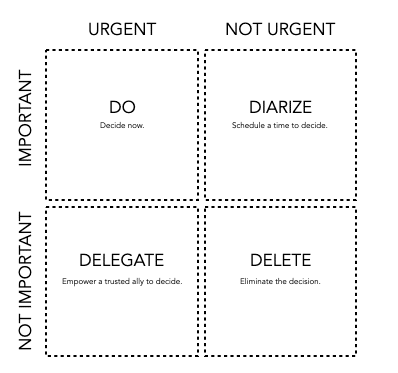Have you ever been in a meeting and watch as a new email pops up on your phone, with that fear-inducing symbol “❗”?
That little red exclamation point has a mysterious power over our attention. Suddenly, you’ve stopped listening to whoever’s speaking, stopped thinking about how you might contribute some value in the meeting, and all you can think about is, “What’s the emergency?!”
You probably opened the email right away, and whatever task needed to get done jumped to the front of your mind. You might’ve even left the meeting you were in to address the ❗ issue in your inbox.
The ❗ denoted that this task was urgent, but an urgent task isn’t the same thing as an important one. The thing is, our brains have a tough time telling the two apart.
Our brains aren’t good at figuring out what’s important, versus what’s just urgent.
Why? It’s down to a psychological principle called the Mere Urgency Effect.
What is the Mere Urgency Effect?
A recent study identified a psychological principle known as the Mere Urgency Effect. It says that when people decide what tasks to focus on, they often confuse urgency with importance. The research team showed that people prioritize urgent tasks over important tasks, even when the less urgent task offers a greater reward.
Mere Urgency Effect: People prioritize urgent tasks over important tasks, even when the less urgent task offers a greater reward.
Why’s that such a big deal? Well, think about it this way — if you focus on what’s urgent but not important, you’re more likely to feel stressed, overwhelmed, and burnt out. That affects how your long-term happiness in your job, as well as the impact you can make.
You even might miss out on promotions and recognition for your work because you’re not focusing on projects that move the business forward. Instead, you’re constantly putting out fires that aren’t necessary, just urgent.
How to Outsmart the Mere Urgency Effect
Consider these two strategies when separating the urgent from the critical tasks in your day.
- The moment you’re confronted with a new task, ask yourself three simple questions to decide if this task should derail your other priorities.
- Take time to decide which decisions most deserve your attention, using a prioritization tool like the Eisenhower Matrix.
🚀 Learn what makes buyers tick
Join 8k+ of world's best marketers from brands like Disney, Coca-Cola, Google who are learning marketing psychology in <5 mins a week.
1. How to figure out if a new task is urgent or important
If your boss approaches you and asks you to do something right now, how can you tell if it’s urgent or important? Start by asking yourself three questions:
- Who will be impacted if I don’t deal with this task right now?
- If I don’t complete this task right now, will there be ripple effects? For example, is this task delaying someone else’s progress or exposing the company to risk?
- Does this new task contribute to my long-term goals?
If no one is impacted, there are no consequences for not completing the task immediately, and it doesn’t contribute to your goals, it’s probably safe to delay the job until you finish your important work.
2. Prioritize your decision-making
Not all decisions are equally important. By eliminating or delegating urgent but non-critical choices, you can save brainpower for the most challenging decisions. For example, Apple founder Steve Jobs famously fought decision fatigue by wearing the same clothes every day. He was able to eliminate an urgent but low-value decision and save his mental resources for critical issues.
But how do you know which decisions are important and which ones are distractions? The Eisenhower Matrix, a tool developed by President Dwight D. Eisenhower and refined by author Stephen Covey, can help you figure that out.

Source: Created by the author
In this model, decisions are divided into four subcategories, depending on how urgent and important they are:
- Urgent and Important = Do these decisions now. They can’t wait.
- Urgent but not Important = Delegate these tasks to someone you trust.
- Not Urgent but Important = Diarize the decision. In other words, put it in your calendar to tackle later.
- Not Urgent and Not Important = Delete these decisions. They don’t matter.
The Bottom Line
When it comes to making better decisions in the heat of the moment, don’t let adrenaline decide what you should do. Instead, take a breath to consider whether a new task deserves your attention right now. If not, return your focus to the things that will help you achieve your ultimate aim. As Bruce Lee put it:
”The successful warrior is the average man, with laser-like focus.”
